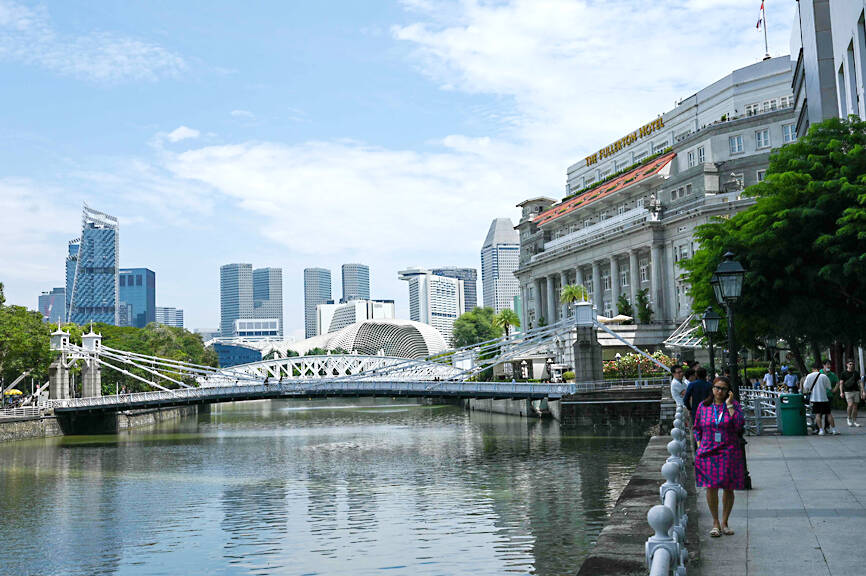Singapore’s economy avoided a recession and expanded 1.2 percent last year, Singaporean Prime Minister Lee Hsien Loong (李顯龍) said on Sunday, while warning that geopolitical risks would weigh on next year’s growth.
The city-state’s economic performance is often seen as a barometer of the global environment because of its reliance on international trade.
“We made 1.2 percent growth this year, avoiding a recession,” Lee said in his New Year’s message.

Photo: AFP
For this year, growth is projected to come in at 1 to 3 percent, “but much will depend on the external environment,” he said, pointing to the continuing war in Ukraine and Israel’s conflict with Hamas.
The economy has been hurt by softer global demand for its exports, with the return of air travel after the COVID-19 pandemic boosting domestic growth.
“For some years to come, we must expect the external environment to be less favorable to our security and prosperity. Geopolitical uncertainties will continue weighing on the global economy,” Lee said.
“In our own region, there are tensions and risks over rival claims in the South China Sea, and because of the cross-Strait situation. These can affect confidence in the region, and hence our growth.”
Maritime tensions have risen in the sea after China and the Philippines traded blame for a series of incidents in the area, including a collision between their vessels.
Lee also cited climate change as another challenge for the low-lying island-state.
“We are already feeling its effects,” he said. “Singapore needs to adapt to and prepare for rising temperatures and sea levels, and to transition our economy to net zero carbon emissions. It will be costly and demanding.”
Lee, who has been prime minister since 2004, called for unity as he prepares to hand over leadership this year to Singaporean Deputy Prime Minister Lawrence Wong (黃循財), who is also the finance minister.
“This is not the first time we are having a leadership transition, but transitions are always delicate,” Lee said, adding that Singapore “will come under close scrutiny” on whether it “can remain successful and exceptional.”

A proposed 100 percent tariff on chip imports announced by US President Donald Trump could shift more of Taiwan’s semiconductor production overseas, a Taiwan Institute of Economic Research (TIER) researcher said yesterday. Trump’s tariff policy will accelerate the global semiconductor industry’s pace to establish roots in the US, leading to higher supply chain costs and ultimately raising prices of consumer electronics and creating uncertainty for future market demand, Arisa Liu (劉佩真) at the institute’s Taiwan Industry Economics Database said in a telephone interview. Trump’s move signals his intention to "restore the glory of the US semiconductor industry," Liu noted, saying that

On Ireland’s blustery western seaboard, researchers are gleefully flying giant kites — not for fun, but in the hope of generating renewable electricity and sparking a “revolution” in wind energy. “We use a kite to capture the wind and a generator at the bottom of it that captures the power,” said Padraic Doherty of Kitepower, the Dutch firm behind the venture. At its test site in operation since September 2023 near the small town of Bangor Erris, the team transports the vast 60-square-meter kite from a hangar across the lunar-like bogland to a generator. The kite is then attached by a

Foxconn Technology Co (鴻準精密), a metal casing supplier owned by Hon Hai Precision Industry Co (鴻海精密), yesterday announced plans to invest US$1 billion in the US over the next decade as part of its business transformation strategy. The Apple Inc supplier said in a statement that its board approved the investment on Thursday, as part of a transformation strategy focused on precision mold development, smart manufacturing, robotics and advanced automation. The strategy would have a strong emphasis on artificial intelligence (AI), the company added. The company said it aims to build a flexible, intelligent production ecosystem to boost competitiveness and sustainability. Foxconn

Leading Taiwanese bicycle brands Giant Manufacturing Co (巨大機械) and Merida Industry Co (美利達工業) on Sunday said that they have adopted measures to mitigate the impact of the tariff policies of US President Donald Trump’s administration. The US announced at the beginning of this month that it would impose a 20 percent tariff on imported goods made in Taiwan, effective on Thursday last week. The tariff would be added to other pre-existing most-favored-nation duties and industry-specific trade remedy levy, which would bring the overall tariff on Taiwan-made bicycles to between 25.5 percent and 31 percent. However, Giant did not seem too perturbed by the